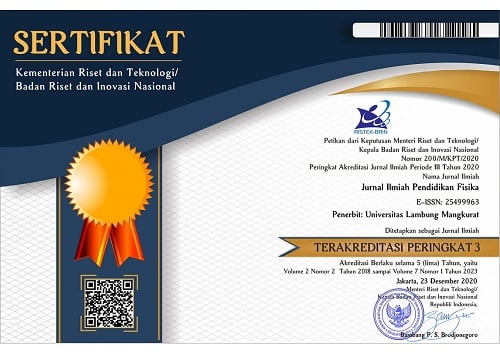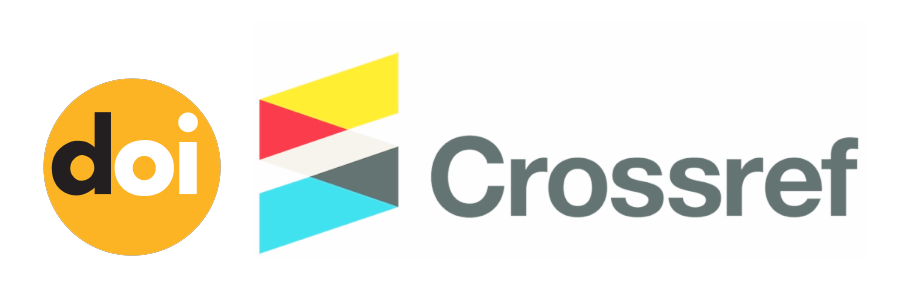Implementation of Differentiated Discovery Models to Improve Students’ Understanding of Physics Concepts and Science Process Skills
Abstract
This study aimed to improve students’ understanding of physics concepts and science process skills by combining the discovery model with the differentiated instructions approach. This study used the Collaborative Classroom Action Research method, which was carried out in two learning cycles with 36 research subjects in class X.1 at a high school in Banjarmasin. Each learning cycle comprised several meetings involving the stages of plan, do/action, see/observation, and reflection. The results from cycle I indicated that 8.33% of students had completed all the indicators of learning objectives (ILO) related to understanding the physics concept of alternative energy. Furthermore, there was an enhancement in students’ process skills, with an average increase of 37% falling into the “Less” category. The results in cycle I showed that learning activities required improvement for cycle II. The results in cycle II showed that 78% of students had completed all the ILO of understanding physics concepts, and there was an increase in students’ processing skills with an average score of 66.67% in the “Good” category. An increased understanding of physics concepts with an N-Gain value in the “High” category had a strong positive relationship with an increase in science process skills in the “Medium” category. Based on the findings of this study, it was identified that the differentiated discovery model could improve students’ understanding of physics concepts and science process skills because it could facilitate students’ learning needs, thus providing implications for students’ activeness and receptiveness to information learning physics in class.
Keywords
Full Text:
PDFReferences
Anggraini, R. D., Murni, A., & Sakur. (2018). Differences in students’ learning outcomes between discovery learning and conventional learning models. Journal of Physics: Conference Series, 1088, 012070. https://doi.org/10.1088/1742-6596/1088/1/012070
Aprilia, M., Lubis, P. H. M., & Lia, L. (2020). Pengaruh model discovery learning terhadap pemahaman konsep siswa sma berbantuan software tracker pada materi ghs. Jurnal Pendidikan Fisika Dan Teknologi, 6(2), 320–326. https://doi.org/10.29303/jpft.v6i2.2286
Breaux, E., & Magee, M. B. (2013). How the best teachers differentiate instruction. Routledge.
Busthomy, A. M., & Hamid, A. (2020). Kesiapan belajar peserta didik terhadap hasil pembelajaran pendidikan agama islam (pai) berbasis daring selama pandemi covid-19 di smk antartika 2 sidoarjo. Jurnal Pendidikan Islam, 8(3), 1–14.
Cintia, N. I., Kristin, F., & Anugraheni, I. (2018). Penerapan model pembelajaran discovery learning untuk meningkatkan kemampuan berpikir kreatif dan hasil belajar siswa. Perspektif Ilmu Pendidikan, 32(1), 67–75. https://doi.org/10.21009/PIP.321.8
Colquitt, G., Pritchard, T., Johnson, C., & McCollum, S. (2017). Differentiating instruction in physical education: Personalization of learning. Journal of Physical Education, Recreation & Dance, 88(7), 44–50. https://doi.org/10.1080/07303084.2017.1340205
Fitriana, Kurniawati, Y., & Utami, L. (2019). Analisis keterampilan proses sains peserta didik pada materi laju reaksi melalui model pembelajaran bounded inquiry laboratory. JTK: Jurnal Tadris Kimiya, 4(2), 226–236.
Ginanjar, E. G., Darmawan, B., & Sriyono, S. (2019). Faktor-faktor yang mempengaruhi rendahnya partisipasi belajar peserta didik smk. Journal of Mechanical Engineering Education, 6(2), 206–219.
Hake, R. R. (1999). Analyzing change/gain score. Dept of Physics
Indiana University, 1–4.
Handita, Y. H., Prasetyo, P. W., & Sugiyem, S. (2022). Penerapan model discovery learning untuk meningkatkan keaktifan belajar siswa saat pandemi. Jurnal Derivat: Jurnal Matematika Dan Pendidikan Matematika, 9(1), 82–94.
https://doi.org/10.31316/j.derivat.v9i1.2990
Hariyadi, S. (2014). Bertanya, pemicu kreativitas dalam interaksi belajar. Jurnal Biology Science & Education, 3(2), 143–158.
Herwina, W. (2021). Optimalisasi kebutuhan siswa dan hasil belajar dengan pembelajaran berdiferensiasi. Perspektif Ilmu Pendidikan, 35(2), 175–182. https://doi.org/10.21009/PIP.352.10
Hikmawati, H., Kosim, K., Doyan, A., Gunawan, G., & Kurniawan, E. (2021). Discovery learning model to practice students’ science process skill in elasticity and hooke’s law. Journal of Physics: Conference Series, 1779(1), 012087. https://doi.org/10.1088/1742-
/1779/1/012087
Izzah, F. N., Khofshoh, Y. A., Sholihah, Z., Nurningtias, Y., & Wakhidah, N. (2022). Analisis faktor–faktor pemicu turunnya keaktifan siswa dalam proses pembelajaran mata pelajaran ipa di masa pandemi. Pensa E-Jurnal : Pendidikan Sains, 10(1), 150–154.
Jalal, A. R., Maison, M., Kurniawan, D. A., Al Amin, M., & Hariono, H. (2022). Analisis deskripsi capaian pemahaman konsep peserta didik pada mata pelajaran fisika kelas xi. Jurnal Ilmiah Pendidikan Fisika, 6(2), 336. https://doi.org/10.20527/jipf.v6i2.4990
Kawuri, M. Y. R. T., & Fayanto, S. (2020). Penerapan model discovery learning terhadap keaktifan dan hasil belajar siswa kelas x mipa sman 1 piyungan yogyakarta. Jurnal Penelitian Pendidikan Fisika, 5(1), 1. https://doi.org/10.36709/jipfi.v5i1.9919
Kemdikbudristek. (2022). Capaian pembelajaran revisi. Badan Standar, Kurikulum, dan Asesmen Pendidikan.
Kemmis, S., & McTaggart, R. (1988). The action research planner (3rd ed.). Deakin University Press.
Khristiani, H., Susan, E., Purnamasari, N., Purba, M., Anggraeni, & Saad, S. (2021). Model pengembangan pembelajaran berdiferensiasi (differentiated instruction): pada kurikulum fleksibel sebagai wujud merdeka belajar di smpn 20 kota tangerang selatan. Pusat Kurikulum dan Pembelajaran, Badan Standar, Kurikulum, dan Asesmen Pendidikan, Kementerian Pendidikan, Kebudayaan, Riset, dan Teknologi, Republik Indonesia.
Laia, I. S. A., Sitorus, P., Surbakti, M., Simanullang, E. N., Tumanggor, R. M., & Silaban, B. (2022). Pengaruh strategi pembelajaran berdiferensiasi terhadap hasil belajar peserta didik sma negeri 1 lahusa. https://doi.org/10.5281/ZENODO.7242959
Lestari, N. A., Dinata, A. K. K., Dwikoranto, Deta, U. A., & Pratiwi, H. Y. (2020). Students’ understanding of physics in science process skills using inquiry-link maps: a preliminary study. Journal of Physics: Conference Series, 1491(1), 012069. https://doi.org/10.1088/1742-6596/1491/1/012069
Marlina. (2019). Panduan pelaksanaan model pembelajaran berdiferensiasi di sekolah inklusif. Repository Universitas Negeri Padang. http://repository.unp.ac.id/id/eprint/2 3547
Meyanti, R., Bahari, Y., & Salim, I. (2109). Optimalisasi minat belajar siswa melalui model pembelajaran problem solving. Proceedings International Conference on Teaching and Education (ICoTE), 2(2), 262–266.
Putri, F., Zainuddin, Z., & Miriam, S. (2019). Meningkatkan keterampilan proses sains siswa melalui model pembelajaran inkuiri terbimbing pada materi cahaya. Jurnal Ilmiah Pendidikan Fisika, 3(1), 24. https://doi.org/10.20527/jipf.v3i1.1027
Rahma, T. Y., & Kusdiwelirawan, A. (2020). Analisis keterampilan proses sains siswa pada pembelajaran fisika topik usaha dan energi. Prosiding Seminar Nasional Pendidikan Fisika FITK UNSIQ, 2(1), 124–127.
Rahmasiwi, A., Santosa, S., & Sari, D. P. (2015). Improving student’s science proces skill in biology throughthe inquiry learning model in grade xi mia 9 (ict) sma negeri 1 karanganyar academic year 2014/2015. Seminar Nasional XII Pendidikan Biologi FKIP UNS, 428–433.
Riduwan. (2003). Dasar-dasar statistika. Alfa Beta.
Rosdianto, H., Sulistri, E., Rosmaiyadi, ., Mariyam, ., Husna, N., Citroresmi Prihatingtyas, N., Wahyuni, R., Nurhayati, ., & Citra Utami, . (2018). Correlation between science process skills and the comprehension of physics concept with critical thinking skills on newton’s laws: Proceedings of the Borneo International Conference on Education and Social Sciences, 42–47.
https://doi.org/10.5220/0009016100420047
Sari, D. R. (2023). Differentiated instruction: meeting the students’ diverse needs and uniqueness. In U. Widiati, M. Hidayati, N. Suryati,
Suharyadi, A. N. Wulyani, I. L. Damayanti, N. A. Drajati, S. Karmina, E. L. Zen, L. Hakim, & Prihantoro (Eds.), Proceedings of the 20th AsiaTEFL-68th TEFLIN-5th iNELTAL Conference (ASIATEFL 2022) (Vol. 749, pp. 140–147). Atlantis Press SARL. https://doi.org/10.2991/978-2-38476-054-1_13
Sari, P. M., Sudargo, F., & Priyandoko, D. (2018). Correlation among science process skill, concept comprehension, and scientific attitude on regulation system materials. Journal of Physics: Conference Series, 948, 012008. https://doi.org/10.1088/1742-6596/948/1/012008
Şentürk, C., & Sari, H. (2018). Investigation of the contribution of differentiated instruction into science literacy. Qualitative Research in Education, 7(2), 197. https://doi.org/10.17583/qre.2018.3383
Sugiarti, S., & Ratnaningdyah, D. (2020). Improvement of science process skills through discovery learning model in physics education students. JPPIPA: Jurnal Penelitian Pendidikan IPA, 5(2), 69–74. https://doi.org/10.26740/jppipa.v5n2.p69-74
Susilawati, S. N., Maruf, & Yani, A. (2019). Keterampilan proses sains, gaya belajar, dan hasil belajar fisika. Jurnal Vidya Karya, 34(2), 170–180.
Tomlinson, C. A. (2001). How to differentiate instruction in mixed-ability differentiated instructions provides access for all students to the general education curriculum. the method of assessment may look different for each child, however the skill or concepts taught is the same. classrooms. Association for Supervision and Curriculum Development.
Tomlinson, C. A., & Moon, T. R. (2013). Assessment and student
success in a differentiated classroom. Association for Supervision and Curriculum Development.
Waruwu, O., Azhar, A., & Rahmad, M. (2023). Improving students’ science process skills through the application of learning models discovery learning in senior high school. Scaffolding: Jurnal Pendidikan Islam Dan Multikulturalisme, 5(1), 51–64. https://doi.org/10.37680/scaffolding.v5i1.2306
Winarti, W. T., Rohmadi, M., & Septiana, N. (2021). Respon peserta didik terhadap penerapan model discovery learning berbasis edutainment pada pembelajaran fisika. Physics and Science Education Journal (PSEJ). https://doi.org/10.30631/psej.v1i2.748
Yuliati, C. L., & Susianna, N. (2023). Penerapan model pembelajaran discovery learning dalam meningkatkan keterampilan proses sains, berpikir kritis, dan percaya diri siswa. Scholaria: Jurnal Pendidikan Dan Kebudayaan, 13(1), 48–58. https://doi.org/10.24246/j.js.2023.v13.i1.p48-58
DOI: https://doi.org/10.20527/jipf.v7i3.9004
Refbacks
- There are currently no refbacks.
Indexed by: Jurnal Ilmiah Pendidikan Fisika is licensed under a creative commons attribution-share alike 4.0 international license
Statistics Counter |

















